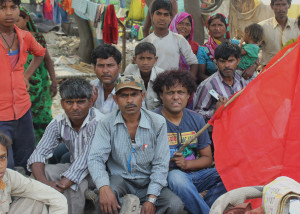Housing and Land Rights Network NGO’s challenges
India & You

Abdul Shakeel Campaign coordinator at HLRN in the center with the homeless people at Mayur Vihar Phase 1
New Delhi based NGO Housing and Land Rights Network (HLNR) addresses the crucial issue of housing shortage in the Indian capital, providing shelter and legal help to homeless people and slum inhabitants. But these are provisory solutions and the roots of the problem – from prohibitive real estate prices to land ownership issues – still have to be dealt legally and by the authorities.
One of the villages Housing and Land Rights Network works in is just few meters from the Mayur Vihar Metro Station, in the Eastern part of New Delhi. This small village of slum dwellers in no way seems to be the part of Indian Capital.
Urban housing shortage is one of the biggest problems India is facing. As per the reports by HLRN, Indian cities have a massive shortage of 18.8 million homes. People coming from rural areas for a job find it extremely difficult to have a house of their own and some end up in slums.
“India has a huge shortage of housing for poor especially in urban context. People don’t have houses just because of the real estate in the urban areas is quite expensive and poor people can’t just afford to buy a house.”, says Abdul Shakeel Campaign coordinator at HLRN.
“When these people migrate and can’t afford a house to stay, they land in the slums like in New Delhi. First they come as a homeless, they live on a pavement; then, after some time, they build shelter and invest some money to build a house. But the land they occupy does not belong to them and after living in these slums for 10-15 years, all of a sudden, they face evacuation without being serving a prior notice” adds Shakeel.
The social consequences are dramatic for the whole family: the children are forced to leave education and their women have no option but to live in the open.
Gudu Singh, the headman of the village HLRN takes care of near Mayur Vihar Metro Station, in East Delhi, has lived in poor conditions for too long : “We have been living here since 1993 and with our hard-earned money we build our small house and government authorities come and demolish, left us homeless”.
Questioning the authorities, Gudu says: “We have no place other than this, where should we go”.
In contradiction with the Indian constitution
This situation is in total contradiction with some core principals of the Indian constitution.
“Article 21 of Indian constitution guarantees every citizen of the country a right to life which means people should have a very dignified life, like they should have a house to live in, they should have proper food, they should have livelihood”, explains the Campaign coordinator at HLRN
But most of the time, these rights of the people are not met.
Hence, the organizations like HLRN raise the voice against such partialities in the society and work for these downtrodden section of the Indian society.
“As an organization, we work on three hierarchical levels. First, we interact a lot with the government and try to change its policies, intervene into the policies and try to make them pro-people”, says Shakeel.
Move to court to avoid evictions
As part of advocacy, HLRN interact with different stakeholders and try to come up with a possible solution to this giant problem of urban housing shortage. However, many a times the organization has to move to court to get the temporary relief to the people.
“The last resort is when nothing happens we go and knock the doors of court, we get temporary relief and many a times we get good responses from the courts” adds Shakeel.
He further explains that “Because of the court orders we have been able to save thousands of people from getting evacuated”..
But the question still lies that for how long NGO’s like HRLN would bring temporary relief to these slum dwellers by stay orders from the court. Instead, India should make long term developmental programs to eradicate the disparities people are facing in terms of having their own houses to live in. It is a wider issue, as even sometimes the Indian middle class finds it hard to have a good accommodation in expensive cities.









